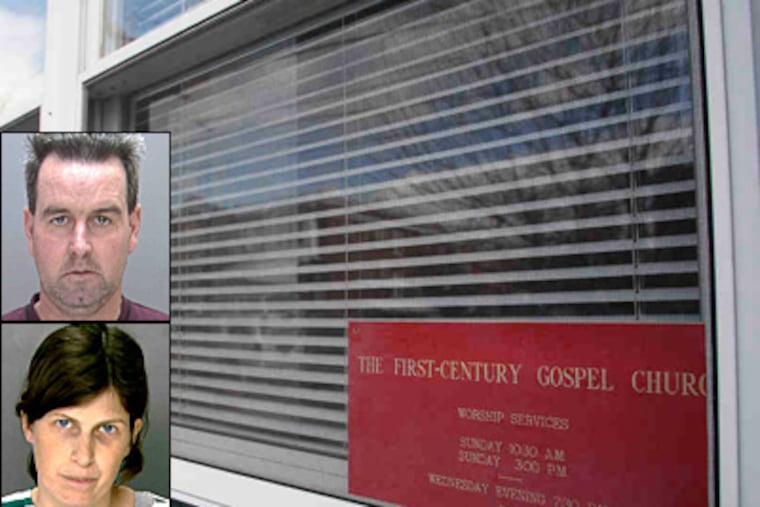In faith healing trial, Philadelphia father said devil killed son
The autopsy said 2-year-old Kent Schaible died after a two-week battle with bacterial pneumonia. But to his parents, the cause of the boy's fatal illness transcended any microbe.

The autopsy said 2-year-old Kent Schaible died after a two-week battle with bacterial pneumonia.
But to his parents, the cause of the boy's fatal illness transcended any microbe.
"We tried to fight the devil, but in the end the devil won," Herbert Schaible, 42, told a city social worker just days after his son's death on Jan. 24, 2009.
On Wednesday, with the involuntary-manslaughter trial of Schaible and his wife, Catherine, 41, in its second day, the social worker, Kenneth Dixon, told a Common Pleas Court jury about his visit to the couple's home in the city's Rhawnhurst section to check on the welfare of their six other children.
The prosecution alleges that the Schaibles put their religious belief in faith healing above Kent's interests, praying over him instead of taking him to a doctor.
Herbert Schaible "told me it was the first child who had ever died with their method of using prayer to get healthy," Dixon, of the Department of Human Services, said under questioning by Assistant District Attorney Joanne Pescatore. "They believe in divine intervention. Their children had never gone to a doctor or taken medication."
No court order was needed for the visit, Dixon said, and the Schaibles were courteous and cooperative. The nurse who accompanied him found the surviving children healthy and well cared for.
Consequently, DHS decided there was no reason to keep an open file on the family, and the records were expunged, Dixon said. Religious beliefs alone, he said, are not enough to justify DHS intervention or the removal of children from a home.
Defense attorneys Bobby Hoof and Mythri Jayaraman have argued that the prosecution cannot prove involuntary manslaughter because there is no evidence the Schaibles knew their son was in danger of dying.
Testimony is expected to conclude Thursday with defense witness Cyril H. Wecht, a Pittsburgh forensic pathologist who helped investigate the deaths of Elvis Presley, JonBenet Ramsey, and Clinton administration aide Vincent Foster.
Hoof told the jury in his opening statement Tuesday that Wecht would testify that the bacterium that killed Kent - Hemophilus influenza Type B - is drug-resistant and that medical intervention would not have saved the child.
Despite the Schaibles' religious beliefs, Dixon testified, their home seemed typical of mainstream America. There was a computer for the children, a basement playroom filled with toys, an outdoor play set, and a well-stocked pantry.
But on the issue of medical care, he said, the Schaibles were unwavering, even days after their son's death.
"They said they believe it's God's will and they will accept whatever happens," Dixon told the jury.
The Schaibles are members of First Century Gospel Church, at 4557 G St. in Juniata Park. Herbert Schaible also teaches at the church school in the city's Lawndale section.
Founded in 1925 on a fundamentalist interpretation of Scripture, the church teaches that seeking medical care demonstrates lack of faith in God. That stance has put it at odds with civil authorities when illness or injury threatens the young.
In 1991, the church and another fundamentalist congregation, Faith Tabernacle of Nicetown, came under city scrutiny when eight children of church members died in a measles epidemic.